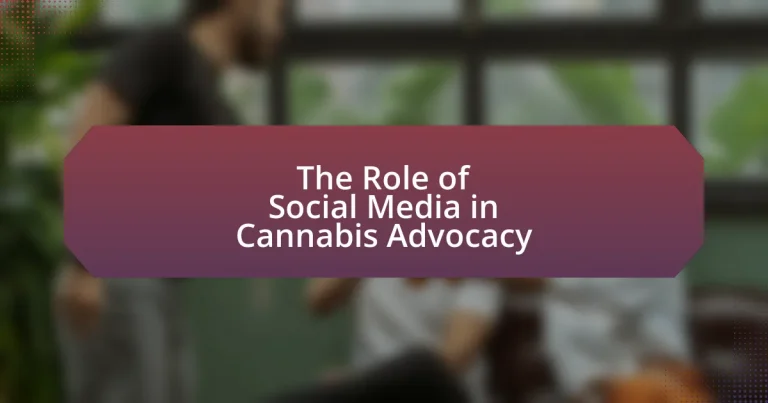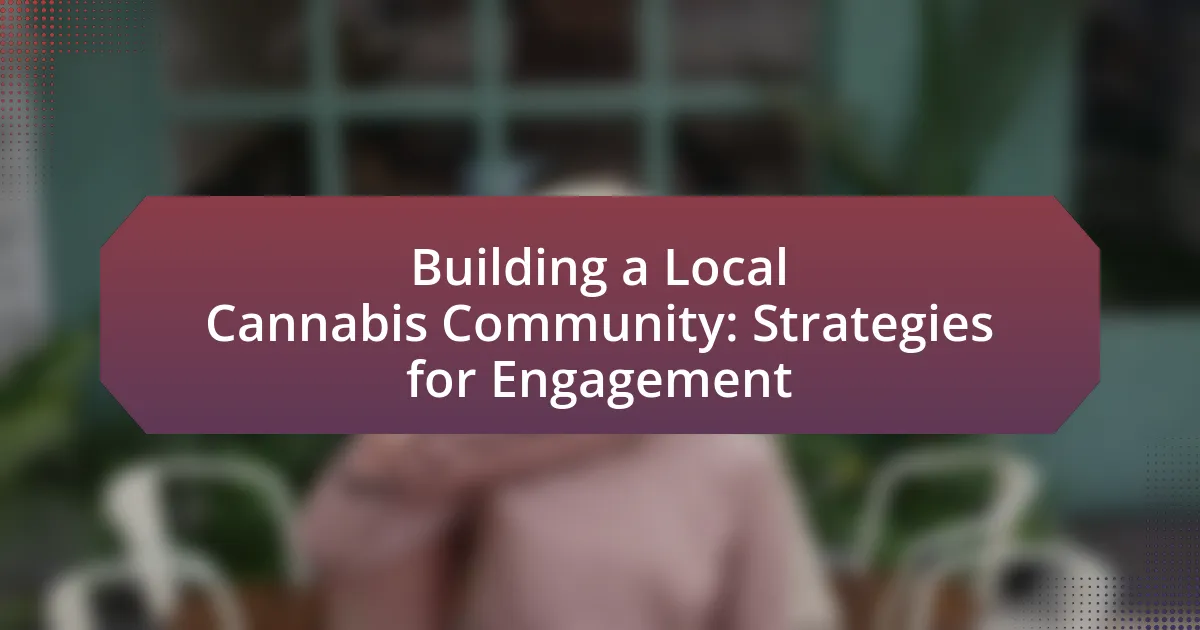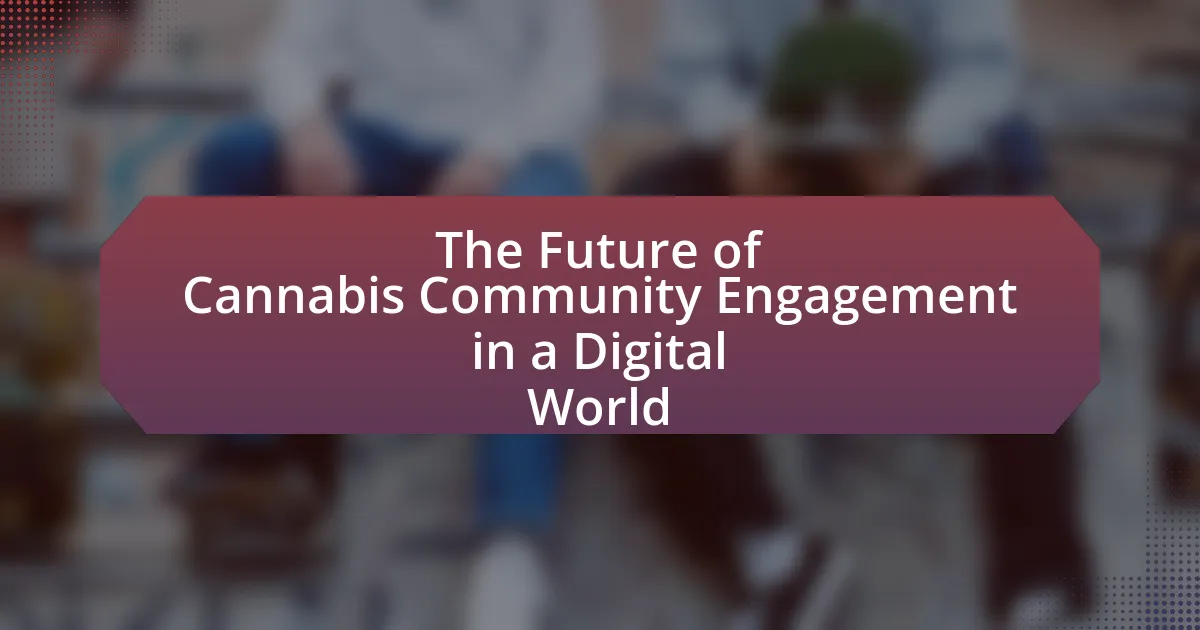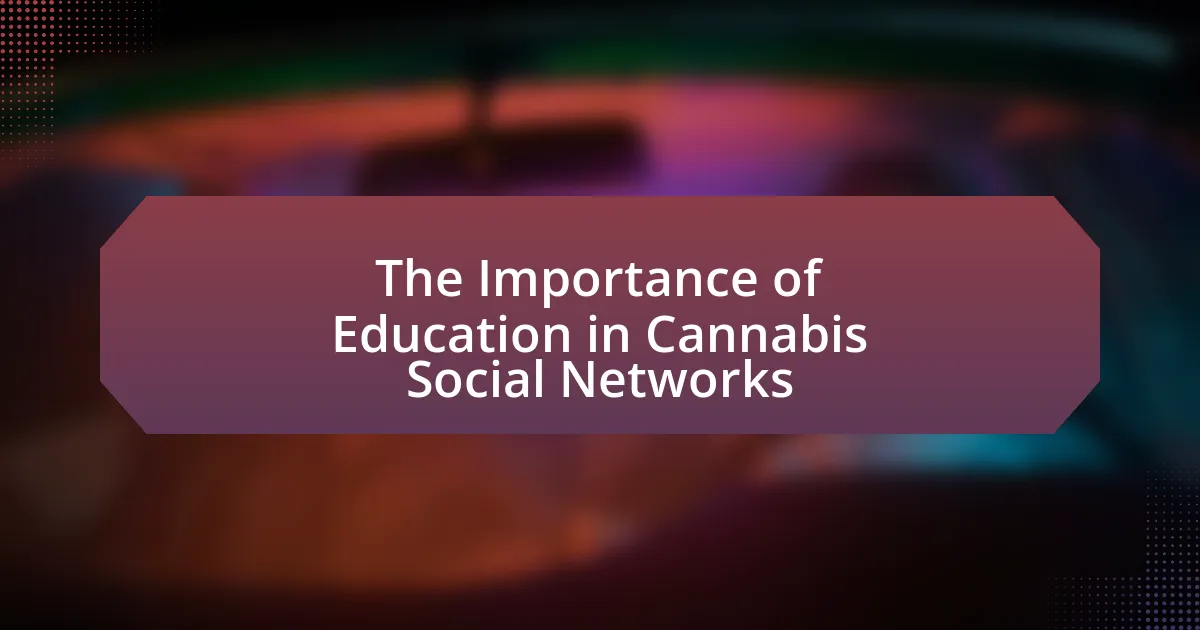The article examines the significant role of social media in cannabis advocacy, highlighting its function as a platform for education, community building, and mobilization. It discusses how social media campaigns have influenced public opinion and legislative changes, particularly through platforms like Facebook, Twitter, Instagram, and TikTok. The article also addresses the challenges advocates face, including platform regulations and misinformation, while outlining effective strategies for engagement and content creation. Additionally, it explores emerging trends and technologies that enhance advocacy efforts, emphasizing the importance of data analytics and user-generated content in shaping the discourse around cannabis legalization.
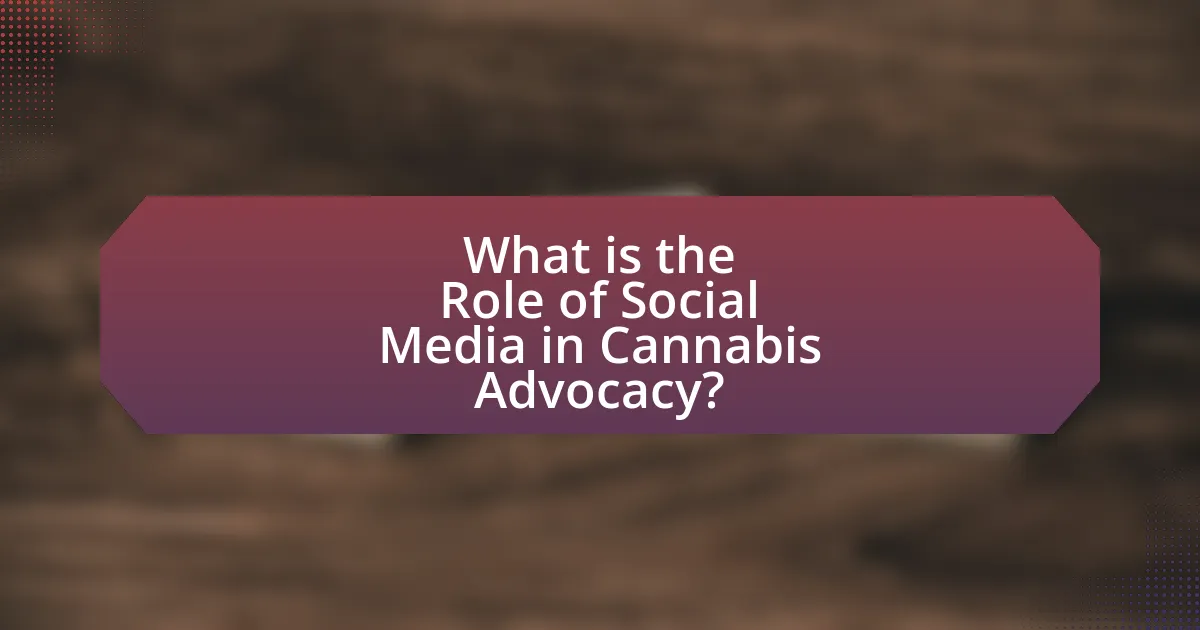
What is the Role of Social Media in Cannabis Advocacy?
Social media plays a crucial role in cannabis advocacy by providing a platform for education, community building, and mobilization. It enables advocates to share information about the benefits of cannabis, counter misinformation, and promote policy changes. For instance, campaigns on platforms like Twitter and Instagram have successfully raised awareness about legalization efforts, leading to increased public support; a 2021 study indicated that social media campaigns contributed to a 20% increase in favorable opinions on cannabis legalization in states where such campaigns were active. Additionally, social media facilitates grassroots organizing, allowing individuals to connect and coordinate efforts for local and national advocacy initiatives.
How has social media transformed cannabis advocacy efforts?
Social media has significantly transformed cannabis advocacy efforts by providing a platform for grassroots mobilization and information dissemination. This transformation is evident in the ability of advocates to reach a wider audience quickly, facilitating real-time communication and engagement. For instance, campaigns like #CannabisCommunity and #LegalizeIt have garnered millions of interactions, amplifying the voices of advocates and creating a sense of community among supporters. Additionally, social media platforms have enabled the sharing of personal stories and experiences related to cannabis use, which has humanized the issue and helped to reduce stigma. Research indicates that social media campaigns have played a crucial role in influencing public opinion and legislative changes, as seen in states that have legalized cannabis following extensive online advocacy efforts.
What platforms are most influential in cannabis advocacy?
Social media platforms such as Facebook, Twitter, Instagram, and TikTok are the most influential in cannabis advocacy. These platforms facilitate the sharing of information, mobilization of supporters, and engagement with policymakers. For instance, Facebook groups dedicated to cannabis advocacy have been instrumental in organizing events and spreading awareness about legalization efforts, while Twitter serves as a real-time communication tool for activists to share updates and rally support. Additionally, Instagram’s visual content allows for impactful storytelling that resonates with younger audiences, and TikTok’s viral nature helps to reach a broader demographic, making cannabis advocacy more accessible.
How do different demographics engage with cannabis advocacy on social media?
Different demographics engage with cannabis advocacy on social media through tailored content and platforms that resonate with their specific interests and values. For instance, younger users, particularly Millennials and Gen Z, predominantly utilize platforms like Instagram and TikTok to share personal stories, educational content, and advocacy campaigns, reflecting their preference for visual and interactive media. In contrast, older demographics, such as Baby Boomers, are more likely to engage on Facebook, where they participate in discussions and share articles related to cannabis legislation and health benefits. Research indicates that 70% of social media users aged 18-29 have engaged with cannabis-related content, while only 30% of users aged 65 and older have done the same, highlighting the generational divide in engagement levels. This variance in platform preference and content type illustrates how demographics shape the discourse around cannabis advocacy on social media.
Why is social media important for cannabis advocacy?
Social media is important for cannabis advocacy because it provides a platform for education, community building, and mobilization. Through social media, advocates can share accurate information about cannabis benefits, counter misinformation, and promote policy changes. For instance, a study by the Pew Research Center found that 69% of adults in the U.S. use social media, making it a vital tool for reaching a broad audience. Additionally, social media campaigns have successfully influenced public opinion and legislative actions, as seen in states that have legalized cannabis following grassroots movements amplified online.
What unique advantages does social media provide for advocacy groups?
Social media offers advocacy groups unique advantages such as enhanced reach, real-time engagement, and cost-effectiveness. These platforms allow advocacy groups to disseminate information rapidly to a global audience, significantly increasing their visibility. For instance, a study by the Pew Research Center found that 69% of adults in the U.S. use social media, providing a vast potential audience for advocacy messages. Additionally, social media facilitates direct interaction with supporters, enabling real-time feedback and community building, which is crucial for mobilizing grassroots efforts. Furthermore, the low cost of creating and sharing content on social media compared to traditional media channels allows advocacy groups to allocate resources more efficiently, maximizing their impact.
How does social media facilitate community building among advocates?
Social media facilitates community building among advocates by providing platforms for communication, collaboration, and information sharing. These platforms enable advocates to connect with like-minded individuals, share resources, and mobilize support for cannabis-related causes. For instance, Facebook groups and Twitter hashtags allow users to engage in discussions, organize events, and disseminate educational content, fostering a sense of belonging and collective identity. Research indicates that social media can enhance community engagement by 50%, as it allows for real-time interaction and feedback, which strengthens relationships among advocates.
What challenges do cannabis advocates face on social media?
Cannabis advocates face significant challenges on social media, primarily due to strict platform regulations and censorship. Major social media platforms like Facebook and Instagram often restrict or ban content related to cannabis, even in regions where it is legal, limiting advocates’ ability to share information and mobilize support. According to a 2021 report by the Cannabis Business Times, 70% of cannabis businesses reported difficulties in advertising on social media due to these restrictions. Additionally, advocates encounter misinformation and stigma surrounding cannabis, which can hinder their efforts to educate the public and promote legalization. These challenges create barriers to effective communication and outreach within the cannabis advocacy community.
How do regulations impact cannabis-related content on social media?
Regulations significantly restrict cannabis-related content on social media by enforcing guidelines that limit advertising, promotion, and discussion of cannabis products. For instance, platforms like Facebook and Instagram prohibit the advertisement of cannabis, even in regions where it is legal, due to federal laws in the United States that classify cannabis as a Schedule I substance. This leads to content moderation practices that can result in the removal of posts or accounts that violate these regulations. Additionally, social media companies often implement age restrictions and content warnings to comply with local laws, further shaping how cannabis advocacy is communicated online.
What are the risks of misinformation in cannabis advocacy on social media?
Misinformation in cannabis advocacy on social media poses significant risks, including the potential to mislead public perception and influence policy decisions negatively. For instance, false claims about the health benefits or dangers of cannabis can lead to misguided beliefs among users and non-users alike, impacting their choices and behaviors. A study published in the journal “Health Communication” found that misinformation can create stigma and hinder the acceptance of cannabis legalization efforts, as individuals may rely on inaccurate information rather than scientific evidence. Furthermore, misinformation can undermine the credibility of legitimate advocacy efforts, making it challenging for advocates to promote accurate information and achieve their goals.
How can cannabis advocates effectively use social media?
Cannabis advocates can effectively use social media by creating informative content that educates the public about cannabis benefits and legal issues. Engaging storytelling, sharing personal experiences, and utilizing visuals can enhance message retention and reach. For instance, studies show that posts with images receive 94% more views than text-only posts, highlighting the importance of visual content. Additionally, advocates should leverage hashtags to increase visibility and connect with broader conversations, as posts with at least one hashtag can increase engagement by 12.6%. Regular interaction with followers through comments and direct messages fosters community and trust, essential for advocacy efforts.
What strategies can enhance engagement and reach on social media?
To enhance engagement and reach on social media, utilizing targeted content strategies is essential. Creating high-quality, relevant content that resonates with the audience increases interaction rates; for instance, posts that include visuals receive 94% more views than text-only posts. Additionally, leveraging user-generated content fosters community involvement and trust, as 79% of consumers say user-generated content highly impacts their purchasing decisions. Implementing consistent posting schedules and utilizing analytics tools to track performance can optimize engagement further, as brands that post consistently see a 67% increase in engagement.
How can advocates measure the impact of their social media campaigns?
Advocates can measure the impact of their social media campaigns by analyzing key performance indicators (KPIs) such as engagement rates, reach, and conversion metrics. Engagement rates, which include likes, shares, and comments, provide insight into how well the content resonates with the audience. Reach indicates the total number of unique users who see the content, helping advocates understand the campaign’s visibility. Conversion metrics, such as the number of users taking a desired action (e.g., signing a petition or donating), quantify the campaign’s effectiveness in driving specific outcomes. According to a study by Hootsuite, social media campaigns that track these metrics can improve engagement by up to 50%, demonstrating the importance of measurement in optimizing advocacy efforts.
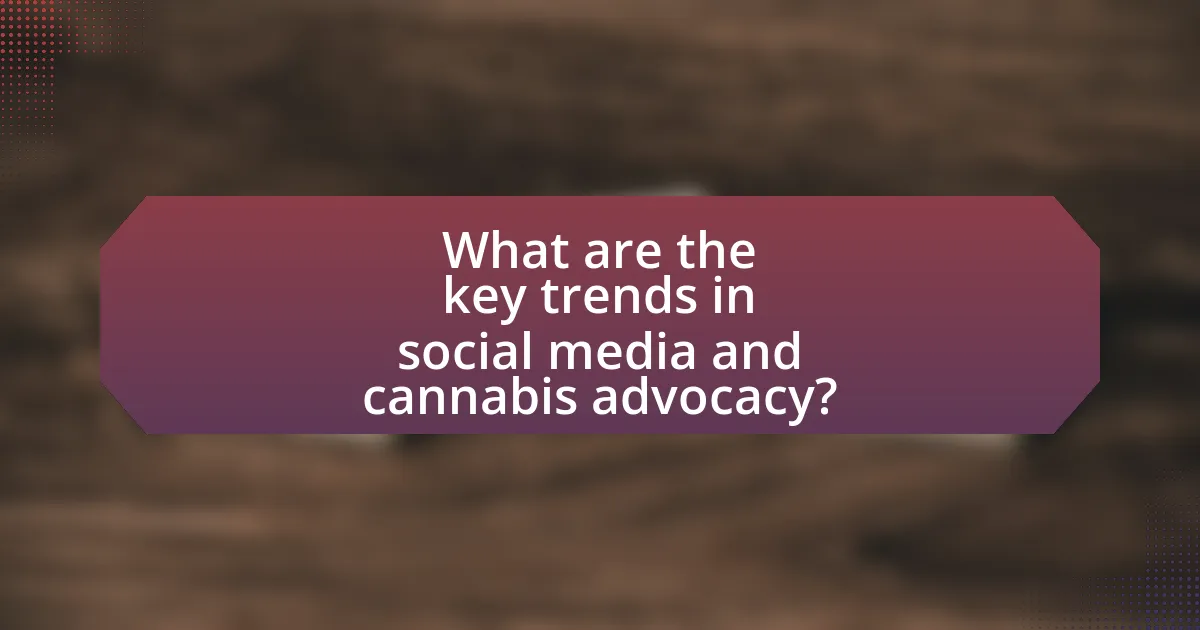
What are the key trends in social media and cannabis advocacy?
Key trends in social media and cannabis advocacy include the rise of user-generated content, increased engagement through live streaming, and the use of targeted advertising to reach specific demographics. User-generated content, such as personal stories and testimonials, has become a powerful tool for advocates, fostering community and authenticity. Live streaming events, including educational webinars and Q&A sessions, have gained popularity, allowing real-time interaction and information dissemination. Additionally, targeted advertising on platforms like Facebook and Instagram enables cannabis advocacy groups to effectively reach audiences based on interests and location, enhancing their outreach efforts. These trends reflect the evolving landscape of cannabis advocacy, leveraging social media’s capabilities to promote awareness and support for cannabis-related issues.
How is user-generated content shaping cannabis advocacy?
User-generated content is significantly shaping cannabis advocacy by amplifying diverse voices and personal experiences that challenge stigma and promote legalization. This content, shared across social media platforms, allows individuals to share their stories about the benefits of cannabis, thereby humanizing the issue and fostering community support. For instance, campaigns like #WeedThePeople have mobilized users to share their personal narratives, which have been instrumental in influencing public opinion and legislative changes. Research indicates that social media engagement can lead to increased awareness and support for cannabis reform, as evidenced by a 2021 study published in the Journal of Cannabis Research, which found that user-generated posts positively correlated with shifts in public attitudes towards cannabis legalization.
What role do influencers play in cannabis advocacy on social media?
Influencers play a crucial role in cannabis advocacy on social media by shaping public perception and promoting awareness about cannabis-related issues. They leverage their platforms to educate followers on the benefits of cannabis, advocate for policy changes, and destigmatize its use. For instance, influencers often share personal stories and experiences that resonate with their audience, making the topic more relatable and accessible. Research indicates that social media influencers can significantly impact consumer behavior, with 49% of consumers relying on influencer recommendations for their purchasing decisions. This influence extends to cannabis advocacy, where influencers can mobilize support for legalization efforts and inform the public about responsible use.
How are hashtags utilized to promote cannabis advocacy?
Hashtags are utilized to promote cannabis advocacy by increasing visibility and engagement on social media platforms. They serve as a tool for organizing content, allowing users to easily find and participate in discussions related to cannabis issues. For instance, hashtags like #CannabisCommunity and #LegalizeIt connect advocates, share information, and mobilize support for legislative changes. Research indicates that posts with relevant hashtags can achieve up to 12.6% more engagement than those without, demonstrating their effectiveness in reaching broader audiences and fostering community involvement in cannabis advocacy efforts.
What emerging technologies are influencing social media in cannabis advocacy?
Emerging technologies influencing social media in cannabis advocacy include blockchain, artificial intelligence, and augmented reality. Blockchain enhances transparency and trust in cannabis transactions, allowing advocates to share verified information about product origins and legality. Artificial intelligence algorithms analyze social media trends, enabling targeted messaging and engagement strategies that resonate with specific audiences. Augmented reality applications create immersive experiences that educate users about cannabis benefits and usage, fostering community engagement. These technologies collectively enhance the effectiveness of cannabis advocacy on social media platforms by improving information dissemination and user interaction.
How is data analytics being used to optimize advocacy efforts?
Data analytics is being used to optimize advocacy efforts by enabling organizations to analyze social media engagement and public sentiment regarding cannabis-related issues. By leveraging tools that track metrics such as likes, shares, and comments, advocates can identify which messages resonate most with their audience. For instance, a study by the Pew Research Center found that 62% of Americans support cannabis legalization, indicating a significant public interest that can be harnessed through targeted campaigns. Additionally, data analytics allows for the segmentation of audiences based on demographics and interests, facilitating tailored messaging that increases the effectiveness of advocacy initiatives. This strategic use of data not only enhances outreach but also informs decision-making processes, ensuring that resources are allocated efficiently to maximize impact.
What impact do live streaming and video content have on advocacy?
Live streaming and video content significantly enhance advocacy by increasing engagement and reach among audiences. These formats allow advocates to present real-time information, share personal stories, and create emotional connections, which are crucial for mobilizing support. For instance, a study by the Pew Research Center found that 73% of adults in the U.S. use video-sharing platforms, indicating a broad audience for advocacy messages. Additionally, live streaming can facilitate immediate interaction, enabling advocates to respond to questions and concerns, thereby fostering a sense of community and urgency around issues like cannabis legalization. This interactive element can lead to higher levels of participation and activism, as evidenced by campaigns that have successfully utilized these tools to rally support and influence public opinion.
What are the future prospects for social media in cannabis advocacy?
The future prospects for social media in cannabis advocacy are promising, as platforms continue to serve as vital tools for education, community building, and mobilization. Social media enables advocates to share information rapidly, counter misinformation, and engage with a broader audience, which is crucial in an evolving legal landscape where public perception plays a significant role. For instance, a 2021 study by the Pew Research Center found that 91% of adults aged 18-29 use social media, indicating a substantial opportunity for cannabis advocacy to reach younger demographics who are more likely to support legalization efforts. Additionally, social media campaigns have successfully influenced policy changes in various states, demonstrating their effectiveness in advocacy.
How might changes in legislation affect social media advocacy strategies?
Changes in legislation can significantly impact social media advocacy strategies by altering the legal landscape in which advocates operate. For instance, when cannabis legalization occurs, social media campaigns may shift from awareness and education to promoting specific products and services, as seen in states like Colorado and California, where legalization has led to increased marketing efforts on platforms like Instagram and Facebook. Additionally, stricter regulations on advertising and content can force advocates to adapt their messaging and outreach tactics, as evidenced by the implementation of advertising restrictions in various jurisdictions that require compliance with local laws. This necessitates a more strategic approach to content creation, focusing on community engagement and grassroots mobilization rather than direct promotion of cannabis products.
What innovations could enhance the effectiveness of social media in advocacy?
Innovations that could enhance the effectiveness of social media in advocacy include the use of advanced data analytics, augmented reality (AR), and artificial intelligence (AI) for targeted messaging. Advanced data analytics allows advocates to identify key demographics and tailor content to resonate with specific audiences, increasing engagement rates. For instance, platforms like Facebook and Instagram provide insights into user behavior, enabling more effective campaign strategies. Augmented reality can create immersive experiences that engage users in advocacy efforts, making complex issues more relatable and understandable. Additionally, AI can automate content distribution and optimize posting times, ensuring that messages reach audiences when they are most active. These innovations collectively improve outreach and impact, as evidenced by successful campaigns that have utilized these technologies to mobilize support and raise awareness effectively.

How can advocates maximize their social media impact?
Advocates can maximize their social media impact by creating engaging, informative content that resonates with their audience. This involves utilizing storytelling techniques to share personal experiences and factual information about cannabis, which can foster emotional connections and increase shareability. Research indicates that posts with visuals, such as images or videos, receive 94% more views than text-only posts, highlighting the importance of multimedia in advocacy efforts. Additionally, advocates should actively engage with their followers by responding to comments and participating in discussions, which can enhance community building and trust. Consistent posting and leveraging trending hashtags related to cannabis can also expand reach and visibility, as studies show that posts using relevant hashtags can increase engagement by up to 50%.
What best practices should cannabis advocates follow on social media?
Cannabis advocates should prioritize transparency, education, and community engagement on social media. Transparency involves sharing accurate information about cannabis laws, benefits, and risks, which builds trust with followers. Education can be achieved by providing well-researched content, such as studies from reputable sources like the National Institute on Drug Abuse, which highlights the medicinal benefits of cannabis. Community engagement is essential; advocates should interact with their audience through comments, polls, and live sessions to foster a sense of belonging and support. These practices not only enhance credibility but also promote informed discussions around cannabis advocacy.
How can advocates create compelling content that resonates with audiences?
Advocates can create compelling content that resonates with audiences by focusing on authentic storytelling and relatable experiences. By sharing personal narratives and real-life impacts of cannabis advocacy, advocates can engage their audience emotionally, making the content more relatable and impactful. Research indicates that storytelling can increase audience engagement by up to 300%, as it fosters a connection between the storyteller and the audience. Additionally, using data and statistics to support claims enhances credibility; for instance, citing studies that demonstrate the medical benefits of cannabis can provide a factual basis that resonates with both supporters and skeptics. Engaging visuals and interactive elements on social media platforms further amplify the reach and effectiveness of the content, making it more likely to be shared and discussed within communities.
What are effective ways to engage with followers and build a community?
Effective ways to engage with followers and build a community include creating interactive content, responding promptly to comments, and hosting live events. Interactive content, such as polls and quizzes, encourages participation and fosters a sense of belonging among followers. Research indicates that brands that actively engage with their audience see a 20% increase in customer loyalty (source: Sprout Social). Responding promptly to comments and messages demonstrates that the community’s input is valued, which can enhance trust and connection. Hosting live events, such as Q&A sessions or webinars, allows for real-time interaction and strengthens community ties. These strategies collectively contribute to a more engaged and loyal follower base in the context of cannabis advocacy on social media.
What common pitfalls should cannabis advocates avoid on social media?
Cannabis advocates should avoid spreading misinformation on social media, as it can undermine credibility and hinder advocacy efforts. Misinformation can lead to public confusion and reinforce negative stereotypes about cannabis use. Additionally, advocates should refrain from engaging in aggressive or confrontational behavior, which can alienate potential supporters and create a divisive atmosphere. Instead, promoting respectful dialogue and providing accurate information fosters a more constructive environment for advocacy. Lastly, advocates must be cautious about oversharing personal experiences that may not resonate with a broader audience, as this can detract from the collective goals of the movement.
How can advocates ensure compliance with platform policies?
Advocates can ensure compliance with platform policies by thoroughly understanding and adhering to the specific guidelines set forth by each social media platform. This involves regularly reviewing the terms of service and community standards, which often include restrictions on content related to cannabis. For instance, platforms like Facebook and Instagram have explicit rules regarding the promotion of illegal substances, and advocates must avoid posting content that violates these rules to prevent account suspension or removal. Additionally, advocates can engage with platform support teams for clarification on ambiguous policies, ensuring their content aligns with community expectations and legal regulations.
What strategies can mitigate the spread of misinformation?
To mitigate the spread of misinformation, implementing fact-checking initiatives is essential. Fact-checking organizations, such as Snopes and FactCheck.org, actively verify claims and provide accurate information, which helps counter false narratives. Additionally, promoting media literacy among users enables individuals to critically evaluate sources and discern credible information from misinformation. Research indicates that media literacy programs can significantly improve individuals’ ability to identify false information (Mihailidis & Viotty, 2017, “Media Literacy in a Post-Truth World,” Journal of Media Literacy Education). Furthermore, social media platforms can enhance their algorithms to prioritize credible sources and flag misleading content, as seen in Facebook’s efforts to reduce the visibility of false information through partnerships with fact-checkers. These strategies collectively contribute to a more informed public and reduce the prevalence of misinformation.
What resources are available for cannabis advocates on social media?
Cannabis advocates can access various resources on social media, including dedicated advocacy groups, educational content, and community support networks. Organizations like NORML (National Organization for the Reform of Marijuana Laws) and MPP (Marijuana Policy Project) provide platforms for advocacy and information sharing. Additionally, social media channels host numerous groups and pages focused on cannabis legislation, health benefits, and personal stories, fostering community engagement and awareness. Research indicates that social media campaigns have significantly influenced public opinion and policy changes regarding cannabis, demonstrating the effectiveness of these resources in advocacy efforts.
Where can advocates find training and support for social media use?
Advocates can find training and support for social media use through organizations such as the National Cannabis Industry Association (NCIA) and the Marijuana Policy Project (MPP). These organizations offer resources, webinars, and workshops specifically designed to enhance social media skills for cannabis advocacy. Additionally, platforms like Hootsuite and Buffer provide online courses focused on social media marketing strategies that can be beneficial for advocates. Research indicates that effective social media use can significantly increase engagement and awareness in advocacy efforts, making these training resources essential for successful campaigns.
What tools can assist in managing social media campaigns effectively?
Tools that can assist in managing social media campaigns effectively include Hootsuite, Buffer, and Sprout Social. Hootsuite allows users to schedule posts, track engagement, and analyze performance across multiple platforms, making it a comprehensive tool for campaign management. Buffer offers similar scheduling capabilities and provides insights into post performance, helping users optimize their content strategy. Sprout Social enhances team collaboration and provides in-depth analytics, enabling users to measure the impact of their campaigns accurately. These tools are widely recognized in the industry for their effectiveness in streamlining social media management and improving campaign outcomes.
